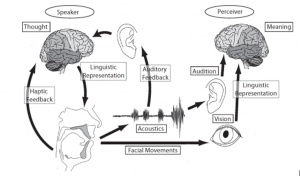How Can You Read a Full Page Without Knowing What You’ve Read? – Psych2go Explains

Everyone has experienced it at some point. You’re reading something: a book, a magazine, an article, anything, and somewhere in between the words your mind starts to wander. Your eyes are still reading and your brain still processing the text but at a certain moment you realise you have no idea what you’re actually reading. You sigh and you go back a few lines. You try again, focussing harder. How is it possible that you’re reading an entire page without taking in any of the information?
This subject is part of an area of psychology we call psycholinguistics. Psycholinguistics is the study of relationships between language related behaviour and psychological processes such as learning a language. It studies how language works psychologically, both socially and neurologically.
By looking at these glitches in our brains, we can learn a lot about the way we process language. But before we can go into the main problem we need to explain two things: the way we are usually taught to read, and the speech chain.
How we are taught to read
In most schools learning to read involves a lot of reading out loud. How else is an instructor supposed to be absolutely sure your student knows how to read? Doing this however, does make it slightly more complicated. There’s the text, your eyes reading it, your brain making sense of the combination of letters, the actual meaning process in your brain, you knowing which sounds you need to say these words, you getting them ready in your mind, and you actually saying the words. There is much more to this, but for now it’s important to know that reading is not just reading and understanding the words. The way we learn to read – by reading out loud a lot – involves a lot of sound processing. Even when we read in silence, most of us are saying the words internally. Some people try to bypass this with special speed-reading techniques. By turning off the ‘mental voice’ you have while reading, you’re supposedly able to read a lot quicker.
YOU MIGHT ALSO LIKE: What is your best personality trait? QUIZ
The speech chain
The speech chain helps us understand how and why you can read without, well, reading. The chain consists of a few different “loops”. For example the auditory feedback loop (you can hear you made a mistake), and the haptic feedback loop (you can feel you made a wrong movement). There are many different loops, but these two hold the answer to our question: “How can we read without taking in information?”.

Image credit: Articulatory Phonetics: Bryan Gick, Ian Wilson and Donald Derrick, 2013.
So how does it happen?
Briefly study the image above. Pay attention to the “facial movements” and the “vision” components and replace “facial movements” with “written text”. Follow the arrow and you arrive at “linguistic representation.” This “linguistic representation” is where our mind transfers what we see on the page to the silent voice in our head. Now, between this and the next step is where the answer to our question lies. Those words to silent sound combinations are transferred once more, until they arrive at the parts of our brain that can turn these strings of information in a meaningful message. But to be meaningful the information first has to get there. When our minds wander the meaningful component is busy doing other things – maybe thinking about the food you will be having for dinner. On the level below that, the areas that turn what you see on the page into the silent voice in your head are still happily doing their thing.
Only when both these loops; the meaning loop and the text-to-sound loop, are working together you take in what you are reading. When the lower level is working but the top level is processing something else, you read, but you don’t truly take in the information. Processing meaning requires more attention than something as automatic as processing letters of a language you know very well into sound in your mind.
Essentially, the lack of focus and cooperation between two parts of your brain gets the information get stuck one level below where you want to get it.
So what do you think of that? Did you know about the existence of the speech chain? Did you guess part of the answer might lie in the way we are taught to read?
Any other things you would like Psych2go to explain? Speed reading? Broca’s aphasia? Non-congenital brain damage? Let us know in the comments below.
More from us:
YOU MIGHT ALSO LIKE: What is your best personality trait? QUIZ
Visit our Patreon for awesome Psych perks!
You might also like: 11 sleeping tips for people with anxiety
Sources
Articulatory Phonetics: Bryan Gick, Ian Wilson and Donald Derrick, 2013.



Would totally love to learn some ways to actually stop this happening, lmao. Especially for people like me who are like 90% sure they have ADHD-PI and are STRUGGLING with these finals!
Could do maybe do research about what makes your mind stop learning and how to fix this?
Been stuck for years now because I can’t seem yo learn new things because my brain is like a stubborn child that won’t cooperate with me so I’ve given up learning and studying for now until I can find a way to unlock this brain block thing.
Fascinating article. Would love to read how speed reading programs work, what their understanding and retention rates are, and how to best implement them if interested. Thanks!
Good article. I have learned to tap into the memory bank of all the information our brain processes every waking moment. 1. The body must be in an exercise mode; 2. Start 15 minutes a day, increase 5 minutes every 5 days. Just thinking about exercising, in a quiet place. Find me in one month.